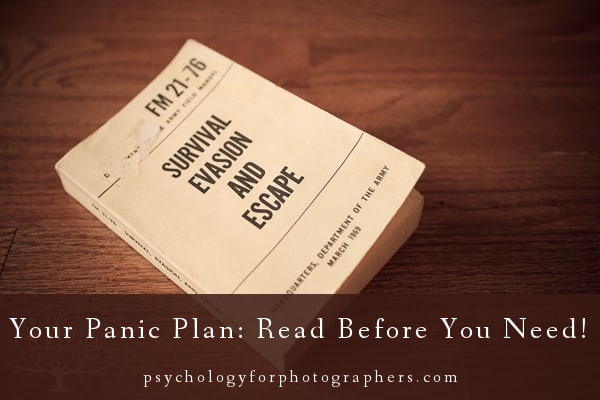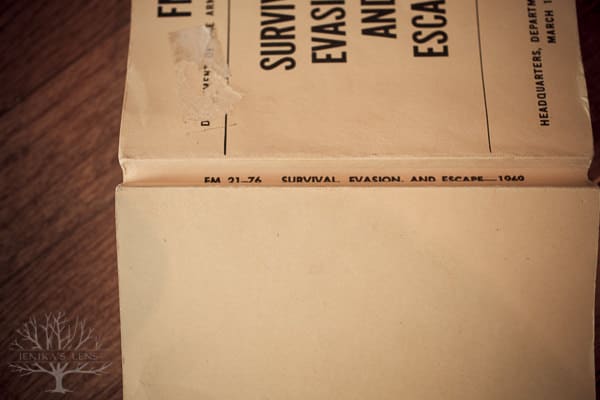The Blog Library
Your Panic Plan: Read Before You Need!
After my grandfather passed away, I found among his things a 1969 Army Field Manual titled: “Survival, Evasion, and Escape.”
This curious volume details things a soldier would need to know if they fall behind enemy lines. Everything from preparing muddy water for drinking, to organizing an escape from enemy transport, to fashioning a needle and thread from a thorn and unraveled clothing.
The sheer number of considerations to be made while surviving in the wilderness and avoiding capture absolutely astonished me.
But what startled me most was a primary refrain running throughout the book.
Before teaching you to carve a snow shelter, avoid mosquitoes, or sight land, they immediately and repeatedly impress upon you the importance of one simple idea:
Don’t panic.
That’s it. Don’t panic.
“Many of the obstacles to be overcome are mental rather than physical,” they warn. Over, and over, and over.
Think about that. In a situation where you have to be worried about enemy weapons, dysentery, drowning, parasites, capture, and nearly every other life-threatener known to man, they devote impressive word count convincing the reader that the most dangerous element they will encounter is themselves.
This makes sense to me.
Because let me tell you a little bit about what happens when you panic.
When your body detects an imminent threat, it releases stress hormones, including adrenaline.
Blood flow is diverted away from your extremities (creating clammy hands, but reducing potential bleeding) and toward certain large muscle groups (getting you ready to run or fight).
As your heart rate rises, your fine motor skills deteriorate (trembling fingers, fumbling to get a key in a lock) and your gross motor skills (running, charging) are enhanced.
But other things happen, too.
As your heart rate continues to rise, your mental capacities diminish.
You may experience tunnel vision (loss of the periphery), and your mind might exaggerate the threat, further exaggerating your response to it.
Skills that involve planning, accuracy, and other kinds of higher cognitive processing are diminished.
In short, your body primes you for immediate action, but not necessarily smart action.
This results in terrible things.
A scuba diver who sights a shark underwater might panic and race to the surface much too quickly, hurting their lungs and organs – causing their own death. A panicked driver might slam down on the accelerator instead of the brake, with tragic consequences. A soldier might bolt from a secure location right into plain sight.
In short? No matter how bad something is, panic will surely make it worse.
You can’t control what happens, but you can control how you respond – and it’s terribly important that you keep calm.
Of course, it’s unlikely that you’ll ever find yourself behind enemy lines.
And we simply can’t compare business to something as serious as actual combat.
But not unlike The Art of War and other military books later studied for pure strategy’s sake, I think there are a few parallel lessons to be drawn for use in business.
Because your body triggers the same response to emotional threats as it does to actual physical threat.
When you become extremely worried or experience an emotional stressor, your body triggers essentially the same stress hormones as it would if you ran into a snarling bear.
Have you ever called an angry client, only to have your breath catch in your throat and your hands shake? What about when reading a scathing, nasty review of your services on Google – did your heart pump faster? Did you lose your ability to concentrate or think straight? When you lost a client that was critical to paying your bills this month, did you feel sweaty and nauseated?
Adrenaline, heart rate, suppressed mental processes…..the same panic story applies.
Client problems, competition, nasty comments, bad reviews, the feeling of falling behind – all can trigger panic.
When you panic in business, your body responds by preparing you to do something you don’t need to do (fight and run) while suppressing the very things you DO need to have a handle on (planning, fine motor skills, attention to detail).
Next time something “bad” happens, and you feel yourself spiraling into panic, here’s how to get through it.
(Note: Of course, if you find that panic attacks happen quite often, and sometimes aren’t triggered by anything stressful at all, this might indicate something more serious and I’d advise you to seek professional advice. This article is referring to isolated instances of business stress only.)
#1: First, when something bad happens and you find yourself panicking: Take deep, slow, even breaths.
This cliche has a biological basis.
One of the more dangerous parts about panicking is that it feeds itself. Your heart rate increases, you breathe faster – and this reaction scares you, which triggers an even faster heart rate and even shallower breathing.
When you feel yourself panicking, acknowledge it, and mindfully slow your breathing down. If you need to, watch the second hand on a clock, and breathe in for four counts, out for four counts.
#2: Acknowledge your feelings with calming statements.
You help panic take over when you focus on the thing causing it (the angry client) and ignore your body’s response.
Close your computer, and acknowledge your heart rate, shaking hands, or dizzy feelings.
Say to yourself “This is just my body getting ready to take action. I’m going to stay still until I’ve had a chance to think it through.”
Or: “I’ve responded to hard situations like this before, and I will do it again. Everything was fine before, and it will be again.”
Or: “I know I can figure this out, and I will when my heart and hands have slowed back down. Everything will be taken care of.”
Sound a little woo-woo? Yeah, but here, that doesn’t matter. It works.
3) Don’t Take Action – Yet
The second page of the 1969 military manual asks soldiers to remember this interesting line: “Undue haste makes waste.”
The feeling of “AAAAA have to do something RIGHT NOW” diminishes good judgment, wise decisions, and prudent action. It puts you in an ‘act now, ask questions later’ frame of mind – and you may miss important details.
(This is probably why people go on eBay and end up owning sixteen Backstreet Boys alarm clocks when they needed exactly none. Immediate time pressure? No good.)
Unless you work in the medical or first responder field, it’s unlikely that anyone is going to die if you wait a half an hour to respond to an email – even an urgent one. In fact, sometimes waiting 12 hours on purpose might also give another person a chance to calm down, too.
Rushing to fix something by wildly writing, spending money, overcompensating, or sending frantic texts is not going to help.
Remember, the whole point of the stress response is that your body squeezes out small details and nuances in favor of big, clumsy movement. Wait until the small details and nuances return.
(My own personal guide is that I wait until I can smile at something again…..if I’m calm enough to be able to take my mind off of the problem for a moment, focus on something else and smile, then I’m calm enough to deal with the problem. Not that the problem is a laughing matter or doesn’t deserve full attention, of course, that’s just my own touchstone for knowing that I’ve calmed down enough to handle it. If you can’t look at a picture of a cute kitten and smile, you probably need to do a little more deep breathing.)
4) Inventory your resources.
While you are waiting to regain composure, start an inventory of what you do have.
One of the things that worsens panic is feeling like you have no options, nothing to fight the situation with. That is never true.
If a soldier can make a needle and thread out of a thorn and an unraveled shirt, you can certainly do something about your situation.
No, you can’t necessarily erase a bad Google review, but you can respond to it with compassion and elegance.
No, you can’t do anything about the lost client and revenue, but you can call three clients from last year and invite them in for a follow-up _____, with incentive _____ if they book in the next 7 days.
No, you probably shouldn’t call and scream at someone who stole your image, but you can file a DMCA takedown notice.
There are always options. Always, always, always. If you need help finding the options, see this post on handling worst-case scenarios.
5) “Write when angry, send when not.”
This is one of the most useful pieces of life advice my father has given me (along with his parting words to me when I went to college, “Have fun, don’t puke,” but that’s wisdom for a separate post.)
Sometimes your adrenaline demands action RIGHT NOW. Fine – write the response. Compose the angry letter. Use all that heat and energy into chewing them out in a Word doc – whatever you need to do.
But promise me you’ll do one thing first: Turn off the internet.
Anger breeds anger. If someone sends you an angry email, you’re not going to calm anyone down – including yourself – by sending an angry email in return. Anger is unprofessional, and will only lead to regret. I promise.
Write your strong words, but edit them when you’ve calmed down and can see the right way forward. Write when angry, send when not.
6) Phone a friend.
If quick action is truly necessary, call a friend (or corner your spouse, partner, sister, whomever) and run down the situation and what you plan to do. When you’re in the middle of it, you’re prone to blindly missing something that would be a better course of action.
Of course, be there for others when they need you. Lurking in a forum and only popping up with desperate pleas when you feel like the world is ending is a turn-off to others. Seek help from people with whom you’ve cultivated a genuine relationship.
7) Create Your Own Flight Simulator

If you were training to become a fighter pilot, they wouldn’t send you into the battlefield having only flown in calm skies. Most likely they’d put you in a flight simulator and run you through some pretty horrible scenarios.
Your engine is on fire! It’s dark and your instruments go out! Your landing gear jams! What do you do?
Pilots run these scenarios over and over and over, until they are so familiar with them that they can run through the procedure cold, without thinking.
We want to mentally avoid certain ugly “what if’s.” Who wants to think about this stuff?
But that just ensures that when bad stuff does happen, we suddenly have to react flawlessly when we’re least equipped to do so.
The good news is that you can create your own personal flight simulator right now.
You can face your scary scenarios and work out an action plan.
For example, what would you do if:
An angry client posted a nasty review on Google.
Your clients this month don’t place any orders and you don’t have enough money to pay the bills.
A mom emails, yelling that you are holding her images “hostage” and saying all kinds of crazy things about you.
Pick something you dread (it’s scary, I know) and ask yourself:
1) What calming statement would I use to help me stay level-headed?
2) What resources would I have to help handle this?
3) Who would I call for help, if I needed it?
4) Since I’m calm right now, what email would I compose in return? How would I handle it, step by step?
There’s a reason that pilots, soldiers, firefighters, police, and other professionals have manuals of established procedures for handling problems.
Mid-panic is not a good place to think up solutions. They do it beforehand, and write it down to refer to later. You can do the same thing. You can quickly craft three calming, problem-handling emails right now to have in your drafts folder, so that you can glide right to them when they’re needed.
That way when you do have a panic-worthy situation, you can just say “OK, time to break out the panic plan.” (Actually saying that out loud will probably make you feel 60% less panicky and a maybe even 90% more superhero-esque.)
If all else fails, or if you blindly skimmed through this whole thing because you’re currently in a panic, listen to me right now (:: loving face ::):
You’ve got this.
You’ve handled worse things before, and you are powerful enough to handle this right now.
You will have a roof over your head and you will not go hungry.
You have friends who love you.
There will always be bacon.
There is a reason people have hired you before – and you will make that happen again.
Right now your most important job is to find a place where you can smile again, and move forward.
Warm hugs, and good luck!






